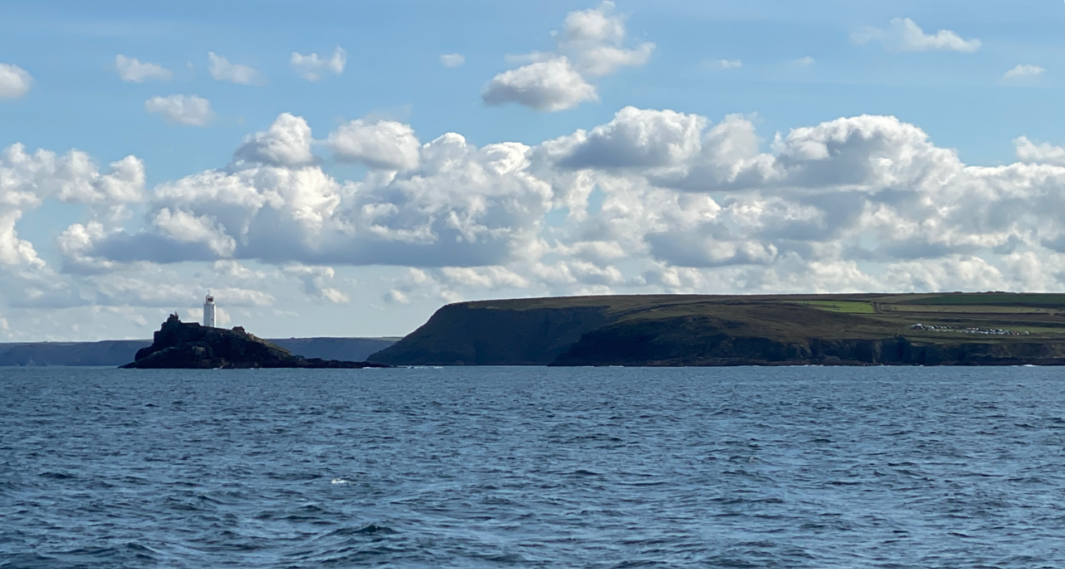Planetary’s CEO Mike Kelland recently appeared on BBC South West’s Politics. In case you missed it, or in case you’ve just learned about the company, this post is a refresher on Planetary’s mission and point of view, an update on our activities in Cornwall, and answers to questions we heard from the BBC, which are some of our commonly asked questions.
What is Planetary doing?
Planetary is a Canadian-based company on a mission to aid in the fight against climate change by increasing the ocean’s natural ability to absorb excess atmospheric carbon dioxide (CO2).
Global warming threatens communities and ecosystems all around the world, but oceans and coastal communities are particularly affected. The ocean naturally absorbs around a quarter of all human-released greenhouse gases, and while this has helped slow the climate effects we see on land, it directly harms marine ecosystems because dissolved CO2 is acidic. Since the start of the Industrial Revolution, the average acidity of our oceans has increased by 30%. This ocean acidification endangers shellfish and the entire marine ecosystem, as well as the coastal communities around the world that depend on that ecosystem.
Every year that we delay action on climate change causes additional damage to our oceans. We must act now to dramatically reduce fossil fuel emissions, and we must pursue solutions to help our oceans and their ecosystems recover. Inaction is something we simply cannot afford.
Planetary has developed one approach that helps both problems. Our process makes the ocean slightly less acidic by neutralising the CO2 that is dissolved in seawater, transforming it into stable salts. This supports our marine ecosystems by reversing dangerous ocean acidification. It also enables the ocean to safely absorb more CO2 from the atmosphere, helping to reduce global greenhouse gas levels and fight climate change.
We are currently running several small-scale studies to help us refine our process and ensure that it is both effective and entirely safe for local marine environments.
Effective carbon removal is not an excuse to continue burning fossil fuels; to get the climate crisis under control we will need to dramatically reduce fossil fuel emissions. However, our process may be able to play a major role in helping to fight climate change. It has the potential to remove two billion tons of CO2 from our atmosphere every year (an amount equivalent to the emissions of 445 million cars), helping offset emissions we cannot eliminate and removing dangerous legacy carbon emissions from our atmosphere.
Shouldn’t we focus on natural solutions?
Absolutely. Nature-based carbon capture solutions like wetland restoration can be an excellent way to reduce the high levels of CO2 in our atmosphere, and often come with many other environmental benefits. But the scale and threat posed by climate change means that we simply cannot afford to rely on one solution to the climate crisis.
We need to bring together all of the safe carbon capture tools at our disposal to protect our planet and environment, including nature-based solutions like planting sea kelp forests or replanting forests, direct air carbon capture, and ocean-based solutions like our technology.
Our approach sits between natural and engineered carbon removal solutions. It boosts a natural carbon removal process: if left alone, the oceans would balance out excess carbon in exactly the same way, but it would take several hundred thousand years. By increasing the ocean’s ability to absorb and store carbon, we’re trying to give it a helping hand.
Why Hayle?
In almost all of our conversations with communities in Cornwall, the first question we’re asked is why Hayle?
We investigated many potential sites across the UK and Canada before settling on Cornwall. This investigation was funded in part by a UK government grant, which supported several projects with the potential to help the UK meet its net zero goals. Over the course of our exploration, we found that St Ives Bay is a perfect location for our technology.
The shallow turbulent waters off Hayle ensure that carbon capturing alkalinity can effectively and efficiently absorb CO2 from the atmosphere – as it stays within the upper mixing layer on the surface of the ocean. The Hayle water treatment facility near St Ives Bay also has all the infrastructure we need to conduct our initial studies, so there was no need to build anything that could disturb coastal ecosystems.
But our work isn’t limited to Hayle. Our vision has always been to conduct small-scale carbon removal at many suitable locations around the world, rather than mass carbon removal at any single location. Outside of the UK, we’re making great progress at our site in Halifax, Nova Scotia, and are pursuing several other exciting opportunities.
Several team members at Planetary have deep family ties to Cornwall, and we are very proud of both the pioneering role that Hayle is playing in building a healthier future and the contributions it is already making in the fight against climate change.
Is your approach safe?
We know how important the sea is to its local inhabitants, and how important St Ives Bay in particular is to the Cornish economy and to residents’ everyday life. Given that, our first priority has always been safety.
We are committed to using safe materials, to operating within local regulations and safety limits, to monitoring for changes diligently, and to progressing forward with our studies cautiously. Our work builds on decades of independent scientific research, and we are confident that our studies in Cornwall and around the world are safe for both local marine environments and the humans who rely on them.
The mineral we are proposing for use in Cornwall is magnesium hydroxide.
While using magnesium hydroxide to permanently remove excess CO2 from our atmosphere is groundbreaking, its use in marine environments is not. Magnesium hydroxide is used every day to make waste water safe and to boost the health of shellfish on aquaculture farms around the world. Magnesium hydroxide and its interactions with marine life are very well understood.
Leading global authorities on the safe use of chemicals, like the European Chemicals Agency, confirm that magnesium hydroxide does not meet any of the criteria needed to be deemed dangerous to marine or terrestrial life. And while all the evidence tells us that magnesium hydroxide is safe, we believe it’s important to verify this directly. As an extra measure, we closely monitor the local marine environment before, during, and after every trial to identify any unexpected changes in the ecosystem.
What were the results of your first trial?
After extensive lab tests, we undertook the first ever field trial of our technology in St Ives Bay in September 2022. The results of that trial are currently being reviewed by independent groups and will be published in a peer-reviewed journal shortly.
As with any serious scientific trial, the process of peer review is vital to ensuring that our results and conclusions remain accurate and unbiased. As the findings from this trial will play a huge role in shaping not just the development of our technology but the growing field of carbon removals, we want to make certain that the scientific community can fully review our methodology and results before we share them more widely.
Once our review process has been completed, we will share the complete results publicly.
What can we expect from you in the future?
While our next steps will depend on the results of our first trial, they will also depend on the voice of the community.
Planetary believes in empowering local voices in the development of climate change solutions, and we will continue to speak openly with communities across Cornwall as we learn more about the potential of our process and the role it may be able to play in Cornwall.
We look forward to sharing our learnings, data, and insights to ensure that everyone in the community has the opportunity to engage with this critical work.



